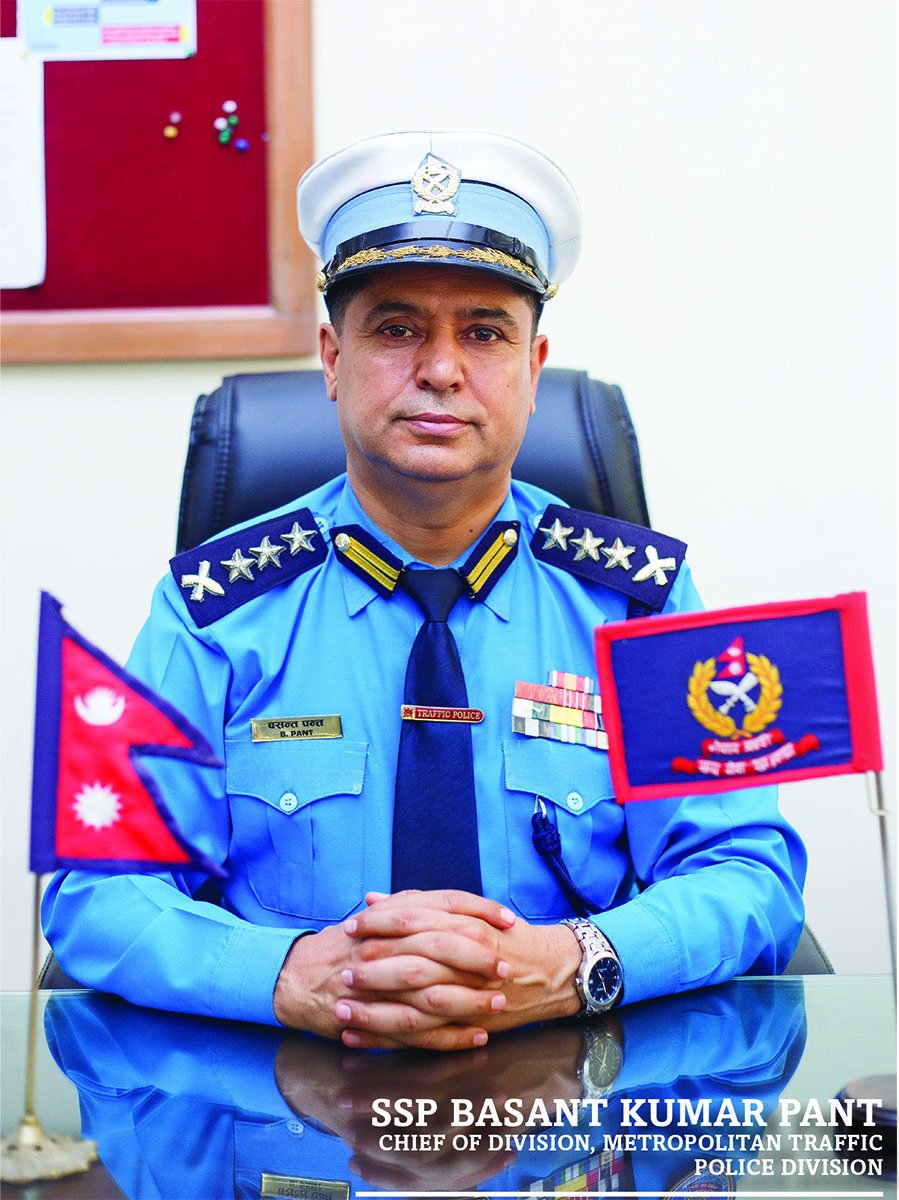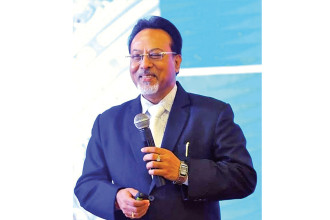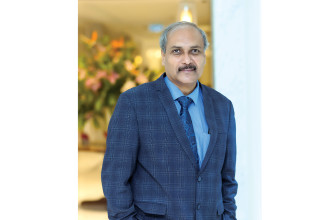
SSP Basant Kumar Pant
Chief of Division, Metropolitan Traffic Police Division
Senior Superintendent of Police (SSP) Basant Kumar Pant is the current Chief of Metropolitan Traffic Division. He has 27 hard earned years of experience in the police force. In his formative years, he had been posted in 19 various demanding locations. He has served most of his time in the traffic division currently serving his fourth posting.
Avant Shrestha of Business 360 sat down with the chief at his station in Bagikhana to discuss his career, traffic issues in the city, and his ambition to manage the division and the traffic and road operations in the city with high efficiency. Excerpts:
Did you always want to join the police force or was it something that happened?
I was born in Dadeldhura and my father was also in the police. The fact that my father was a civil service employee was reason enough for me to be encouraged to take up the same kind of job. It was instilled in my mind from a very young age that even I should work as a civil servant. My mind and motive never went astray. My belief was that I will work as a civil servant hence as a police officer and serve the people.
What was your journey like before you joined the police force?
I knew I wanted to work as a civil servant but I was hesitant on where to go or which line of duty I should pursue. So I came to Kathmandu for my education and right after I completed my diploma, I tried to join the police force but unfortunately I was unsuccessful in my first attempt. So I went for training as an air traffic controller and worked for around nine months. During that time, I, along with my colleagues, were highly frustrated. Everyone complained about the lack of proper infrastructure, nature of job and it felt like a dead end at work. There was no personal development. As a result I resigned from my job because I felt I had to pursue other opportunities. In my second attempt, I was successful in joining the police force as an inspector.
What were the initial days in the police force like?
After I became an inspector, my first posting was in Gaur. When I was there, I learnt about the basics of policing. And after that I went to Kailali. Then I got the opportunity as an Independent Command in Nawalparari, where I had to command a certain area as a new inspector.

What was the key moment in your line of duty that motivated you to dedicate your life to Nepal Police?
During my time in Nawalparasi, there was one incident. There was a person who was responsible for trafficking 50 to 60 girls and we were assigned to solve that case and apprehend the trafficker. By applying various investigation techniques, we were successful in capturing that trafficker.
The story gets interesting when the trafficker agreed to give us the details about his operations after we captured him and rescued the girls. He claimed to have sold close to 50 girls. When I asked him about his wrongdoing and whether he felt any remorse, he told me bluntly that this is strictly business for him. He compared his business to that of a butcher who does not feel sorry for the animals he slaughters. He told me that he just views girls as a product that have a price tag. He said that he needed to have a criminal mind to do his job and considered his crimes as a normal part of his life. Such investigative cases and capturing such people motivated me to move forward in this line of duty.
How has your educational background served you in your current post?
If you have to look at my educational background, I have completed my Masters degree in Public Administration from Purbanchal University and I received my diploma from Tribhuvan University. Additionally, I have taken three international training courses and six courses in Nepal. Recently, we conducted Strategic Command and Management Training. This training helped us in policy making and implementation.
What has your 27 year long career graph been like?
When you talk about my career, the graphs are all ups and downs. The thing is that this job requires my full dedication and sadly I have never been able to give adequate time to my family. I work 13 hours a day. I come in at 7am in the morning and go home only at 8:30 in the evening. Plus, I also work on Saturdays. This job requires my full dedication and I am fully committed to my role here. I believe that this assignment has been my most successful.
I was in charge in 19 posts. I have been in charge in various districts working tremendously hard while gaining lots of experience. But this job as the Chief of the Traffic Police Division has been the most successful and satisfying period in my career because my ideas and changes that I wanted to bring as a traffic police officer are more or less being implemented.
How did you move up to the ranks?
I was stationed in very challenging places with very challenging tasks. During the Maoist insurgency, I was stationed in Rukum among other areas. After I became SP, I got the opportunity to be the In-charge of Dhanusha, Kailali and Nepalgunj. After becoming the SSP, I got the opportunity to work at the Commission for Investigation of Abuse of Authority (CIAA). Then, I received opportunity to manage the traffic as an In-charge of Kathmandu, Bhaktapur and Lalitpur.
I became the DSP twice and SP once and when I was assigned the post, I used to monitor the entirety of the traffic division and monitor the operations of the division. Evaluating my work is what I believe made my superiors give me the responsibility of Chief of the Metropolitan Traffic Police Division.
How can the Metropolitan Traffic Police Division implement international standards of traffic management and mitigate traffic congestion problems?
First of all, I would like to say that I am happy that our organisation has given us an opportunity to get exposure by participating in international trainings, gain knowledge, come back and implement these in the country.
We were given the opportunity to visit Japan, Delhi and United States to observe traffic management there. And by observing the traffic in these nations, I am constantly consulting and coordinating with stakeholders in the country to implement such procedures and methods in Nepal. When you talk about the stakeholders they are Department of Transport Management (DoTM), Department of Roads and Kathmandu Metropolitan City Office.
What is the major role of the Metropolitan Traffic Police Division?
Well, we set highest priority to enforcing and implementing traffic rules and regulations and enhancing road safety for commuters and maintaining traffic flow. Today, we are also making an effort to introduce modern techniques and applying modern technology to regulate, monitor and control road safety.
What are the current methods the Metropolitan Traffic Police Division is doing to better manage traffic in the city?
Currently we are aiming to install more traffic lights and improve road conditions. When we conducted a study, it showed that in Kathmandu alone, we would require 36 traffic lights in key locations. The first phase of our aim is to install these traffic lights. Similarly, we are in need of building 12 overhead bridges. We are also in talks of drawing a number of zebra crossing and installing road signs and signals in key areas. And lastly, we need to introduce mass transport system which is still in the initial stages of the government’s plan.
The three-month plan initiated by the Chief of Police has just concluded and we have planned to extend it to another three months. These include corridor management, pollution reduction management, footpath management and increasing awareness among riders and pedestrians to follow traffic rules and regulations. Plus, we have enforced a ‘pick and drop’ rule. Additionally, we are also researching and doing our homework on how to manage traffic in the next 50 years by holding dialogues and collaborating with various stakeholders.
What does the general public get wrong about the Traffic Police Division?
We have very limited space where we can use our conscience because we are a force. We have to follow the National Laws, the Police Laws and Constitutional Laws and other rules and regulations.
The Traffic Police Division has only 3% of the authority among the entire Police Division. On the other hand, 97% of the authority goes to the other stakeholders and organisations. But in-spite of that, we work the entire 97%. We work everywhere. There are lots of complaints directed to us by e citizens regarding the poor road conditions, lack of traffic lights and no proper signs which can be seen as slightly unfair at times.
What efforts are being made to use technology to better manage traffic issues in the city?
We are working with a manual traffic management strategy at the moment. But we have started to apply technology based traffic management. For example, we have started using traffic lights in some important junctions. We use the help of CCTV cameras, GoPro cameras and we even have surveillance vehicles. We have started enforcing the use of radar guns to monitor and maintain speed in various locations in the city.
How do you take action against traffic rule offenders?
We are applying all these methods and it gives me satisfaction to know that the offenders are being fined. But saying that does not bring us pleasure. The day when all the citizens follow the rules and when we do not need to fine them for any offenses, I believe as a traffic police division that would bring us satisfaction.
However, one thing that I am really satisfied about is that drinking and driving has reduced drastically. There are less than 100 people who are caught in drink and driving cases. As a result, the drink driving related accidents have reduced as well. Plus, we have enforced ‘lane’ discipline and become stricter. We have brought in new methods to monitor through cctv, information via phones, identification of culprit and fining them.
We have made efforts to directly contact people, educate and raise awareness on traffic rules and safe road etiquettes. We are trying to raise awareness at the school level, through the community level and through the people who drive various vehicles.
Speeding, reckless driving, jaywalking and haphazard overtaking among others are the leading causes of road accidents. Additionally, there are still many people who are not inclined to follow the rules.
What kind of efforts has the division done to raise awareness?
We have conducted lots of activities. For example, we have made documentaries, we go door to door to spread important information, and we have collaborated with various stakeholders including the media to spread awareness about traffic rules and the importance of following them.
Then again, raising awareness is only one side of the spectrum, we have to make the rules stricter. For example, we fine individuals who cross roads in dangerous manner although we have stopped fining people at them who do not use zebra crossing while crossing the street. We have plans to bring that rule back again. We have to give them access as well. For example, we cannot fine individuals if there are no zebra crossings available. Our responsibility as an organisation with authority is to implement basic laws and rules and it is the responsibility of the citizens to follow them.
What are you views on leadership?
When you talk about the present scenario, I have 1450 individuals working in my unit. 50 staff directly working under me. First thing I try to implement within them is my vision and make them aware of my main goals and then our organisational goals and the direction given to us by our superiors. We try to install the vision and goal to the ground level.
Our major goals and responsibilities are reflected by the on-duty police out in the field. His or her nature, work ethic, behaviour and responsibility is interlinked with my leadership. There is a direct connection between his performance and my leadership skills; that is why, I believe it is essential to motivate them.
What action is taken against officers who bend the rules?
We take internal actions against Traffic Police who are responsible for unprofessional, unethical and anti-police conduct. Just recently I had to release 50 to 60 officers off their duties for such reasons.
What is your personal and professional objective for the near future?
My objective is to diligently perform my duties as long as I am required to. I try to do the works that are required at an organisational level. I believe that I am an honest officer who does his work honestly. My past works and postings stand as a testament to my claim. Whatever the department requires me to do, I will continue to perform as long as I wear this uniform. Because of this uniform I have experienced professional development, my family is well taken care of, and I have been able to improve our social status.






